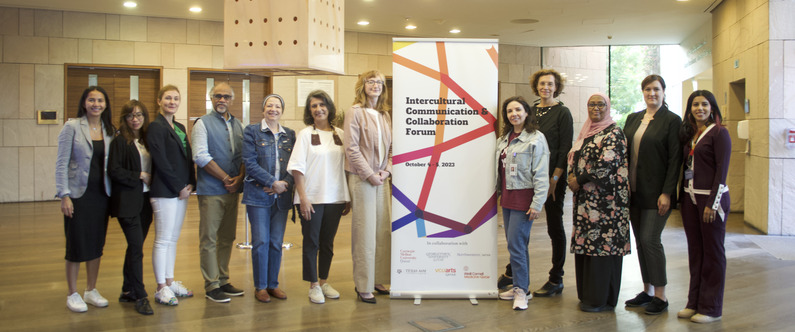ICCF 2023 highlights intercultural communication and collaboration
 ICCF 2023
ICCF 2023
Weill Cornell Medicine-Qatar (WCM-Q), in partnership with Qatar Foundation (QF) international branch campuses, organized the latest Intercultural Communication & Collaboration Forum (ICCF), an annual initiative designed to promote intercultural communication and collaboration competencies among QF’s Education City (EC) institutions.
The forum was established in 2015 and includes Weill Cornell Medicine-Qatar, Carnegie Mellon University in Qatar, VCUarts Qatar, Texas A&M University at Qatar, Georgetown University in Qatar, and Northwestern University in Qatar. This year, the ICCF invited the Institute for Developing Across Differences (IDD) from New York, US, to provide interactive, hands-on learning experiences to the EC community.

The ICCF program started with a roundtable discussion between higher education leaders from participating institutions, highlighting the facets of intercultural communication and collaboration in EC.
The ICCF program featured six workshops presented by five internationally renowned scholars. They included Dr. Nagesh Rao, a professor and coach; Prof. Annette Gisevius, a professor, content designer, trainer, and certified coach; Sherifa Fayez, an educator and trainer; Dr. Nadine Binder, a psychologist, certified Co-Active coach (CPCC), and trainer; and Dr. Mai Nguyen, a specialist in neuroscience and cross-cultural management. The workshops covered unique topics such as facilitating intercultural discovery, reducing cross-cultural tensions, culturally adaptive coaching, and neuroscience in intercultural communication.
Maha Elnashar, director of the Center for Cultural Competence in Healthcare (CCCHC) at WCM-Q’s Institute for Population Health (IPH), said: “This year’s iteration of the ICCF was another wonderful opportunity to engage with like-minded professionals and collectively work towards promoting the most effective forms of intercultural communication. Through enhanced intercultural understanding, we are better equipped to embrace our cultural differences and similarities and deliver more effective teamwork and quality outcomes.”
Huda Abdelrahim, senior specialist in cultural competence in healthcare at CCCHC, said: “Professionals who work in globally diverse environments need specific capacities to achieve their professional and personal goals while sustaining their wellbeing. The ICCF workshops offer an essential framework that equips attendees with critical knowledge and skills, creating a deeper understanding of ourselves and others and forging stronger relations that transcend barriers.”
Dr. Sohaila Cheema, associate professor of clinical population health sciences and assistant dean at IPH, who participated in the ICCF roundtable discussion, commented: “The forum provided a platform to engage with international partner universities and share valuable insights into how we can become better intercultural communicators and, in the process, improve the wellbeing of our community.”
Dr. Ravinder Mamtani, WCM-Q professor of population health sciences and vice dean for population health and lifestyle medicine, and professor of medicine at the Center for Global Health, said: “We are delighted to continue to support and be part of the ICCF. It seamlessly aligns with our own values of promoting the overall wellbeing of the community and enhancing understanding of intercultural communication for our collective benefit as a community.”
Qatar’s multicultural setting has made cultural competence education a pressing need for practicing healthcare professionals. In recognition of this diversity, WCM-Q launched the CCCHC in 2008, a pioneering body that provides training to help students and healthcare professionals understand how culture can impact healthcare delivery and outcomes.